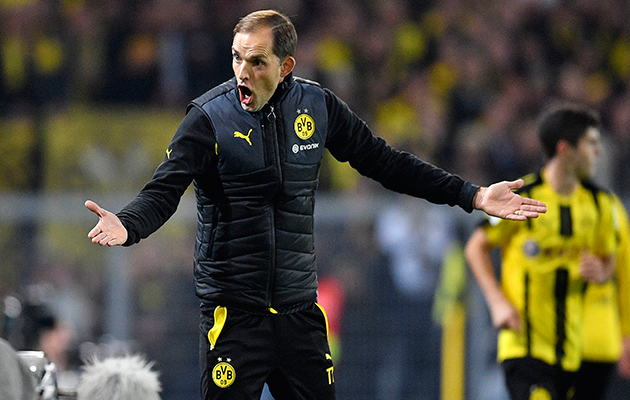Could his team’s German Cup final showdown with Eintracht Frankfurt on May 27 be the swansong of Dortmund coach Thomas Tuchel? Quite possibly so.
With the club’s CEO Hans-Joachim Watzke recently admitting that his relationship with TT was strained and several players briefing against him in the media , there now seems nowhere for Tuchel to go but the exit.
The simmering Tuchel-Watzke clash is to all intents and purposes a difference of opinion about the decision to rearrange Dortmund’s Champions League quarter-final against Monaco just 24 hours after a bomb attack on the club’s bus. A furious Tuchel later alleged neither he or the players had been consulted, taking a particularly big swing at UEFA. Watzke, though, believes the diatribe was equally aimed at he and his fellow board members.
“It was too serious an issue for us to make that decision over the heads of everyone,” declared Watzke in an interview with Westdeutschen Allgemeinen Zeitung. “In the discussions on the Wednesday morning [the day of the rescheduled match]) I made it clear that every player who didn’t feel in a position to play, had until the afternoon to say so. The coach had the right to point that out too, but I was never confronted with such a scenario.”
Incendiary stuff from Watzke. Effectively calling his coach a liar.
Tuchel only has a year left on his current contract and reading between the Watzke lines, a new deal looks problematic indeed: “As always with negotiations, we will not only be talking about the sporting aspect, but also strategy, communication and trust.” Ouch!
Now In his second season at the club, Tuchel cuts an increasingly isolated figure. Dortmund president Reinhard Rauball is adamant the football department were fully kept in the loop during rescheduling talks, while the Suddeutsche Zeitung daily claims that the coach is in conflict with a number of his pro squad. It reported that his gruff, authoritarian ways are creating a bad atmosphere.
One of the brightest, most innovative coaches in Europe, Tuchel undeniably has achieved a lot at the Ruhr giant, twice qualifying them for the Champions League, on course to win the DFB Pokal this term and generally enhancing their status as a Top-Ten continental outfit. But also has a reputation for rubbing people up the wrong way. Blunt, spiky and allergic both to empathy and other opinions.
Although a brilliant tactician, he can overdo the experimentation and for some of his charges, a less complex approach would benefit everyone. “It’s not on to have so many changes of system in one game,” an unidentified player told the SZ. “We can have two changes of formation before half-time.”
Tuchel’s agent Olaf Meinking insists the former wants to stay on. Sadly, it may be too late for that.
What We Learned This Week
1. Making business plans for Leipzig
Now that the Leipziger have clinched a direct Champions League qualifying spot – sealing the deal with an impressive 4-1 win at Hertha Berlin on Saturday – thoughts inevitably have turned to squad strengthening. Club director of sport Ralf Rangnick says he has a €40 million war-chest for three or four new signings, the watch-list including Young Boys of Berne keeper Yvon Mvogo, giant Toulouse centre-back Issa Diop, Wolfsburg playmaker Maxi Arnold and Freiburg second striker Maximilian Philipp. Spot the pattern? Young, talented and with plenty of scope for further improvement.
2. Darmstadt: dying with their boots on
Condemned to the drop after 1-0 loss at Bayern Munich, the Lilies, at least made a springtime fight of it, winning three of their four games prior to travelling to the Allianz-Arena. After replacing sacked coach, Norbert Meier in December, the former German international, Torsten Frings did a fine job of injecting some life and resilience into a previously dispirited group, but ultimately was never going to pull off a repeat of the club’s miraculous survival mission of last term. Too little class, too little strength in depth. “It’s sad that our two-year chapter in the Bundesliga has come to an end,” said club president, Rudiger Fritsch. “It was a great period. Now we have to patch ourselves up and go again.”







